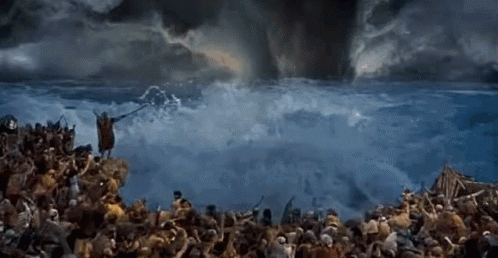 Submitted by Holyman Preter on
Submitted by Holyman Preter on

The biblical text (Exodus 14:21) reads as follows: “Then Moses stretched out his hand over the sea, and the Lord drove the sea back by a strong east wind all night and made the sea dry land, and the waters were divided.”
It is physically and scientifically possible for a body of water to part?
Non-believers typically dismiss the miracles described in the Bible as fiction or metaphor. But according to research, at least one of those supposed impossibilities—the parting of the Red Sea to make way for Moses and the fleeing Israelites—perhaps could have happened.

Software engineer and lead study author Carl Drews described himself to the Washington Post as "one of many Christians who accept the scientific theory of evolution." But he says that his beliefs do not influence his science, and, as the Washington Post points out, his peers seem to mostly agree. The Red Sea work—originally undertaken as his master's thesis—was reviewed and published in a scientific journal and is supported by his current employer, the prestigious National Center for Atmospheric Research.
Drews' work is founded on the idea that, based on a slew of archeological evidence, it wasn't actually the Red Sea, but the Eastern Nile Delta, at a body of water called the Lake of Tanis, that did the parting, the Washington Post explains. Given the conditions of the lake a couple thousand years ago, a coastal phenomenon called a "wind setdown"—very strong winds, in other words—could have blown in from the east, pushing the water to create a storm surge in another part of the lake, but completely clearing water from the area where the wind was blowing. As the Washington Post writes, such events have happened fairly recently in parts of Lake Erie and in the Nile Delta.
Drews created computer models of the ancient system to show this could indeed have happened in 1250 B.C., given the parameters he inferred about the lake, the Washington Post continues. Showing up at the key moment, Moses and the Israelites would have had about four hours to cross the lake, Drews found.
Of course, there are a lot of assumptions here: that the crossing did indeed occur at the lake and not the Red Sea; that the Israelites' timing was spot-on; that Drews got all of the lake parameters correct; and, perhaps most importantly, that the book of Exodus is indeed a historical account and not a work of fiction. As the Post concludes, "While Drews may indeed describe an atmospheric and ocean effect that can really happen, trying to suggest this phenomenon can explain a biblical 'event' is another matter entirely." 1
Splitting Your Own Sea
What is the difference between the land and the sea? Both are vibrant and action-filled enviroments populated by a myriad of creatures and a great variety of minerals and vegetation. Yet the universe of dry land is exposed and out in the open for all to see and appreciate, while the world of the sea is hidden beneath a blanket of water.

In Jewish mysticism (Kabbalah and Chassidic spirituality), these two physical planes reflect the conscious and unconscious dimensions of the human psyche. Both parts of the self are extremely vibrant and dynamic. The difference between them is that while our conscious self is displayed and exhibited for ourselves and others to feel and experience, our subconscious self remains hidden, not only from other people but even from ourselves. Most of us know very little of what is going on in the sub-cellars of our psyche.
If you were given a glimpse into your own "sea" and discovered the universe of personality hidden beneath your conscious brain, what do you think you would find? Shame, fear, guilt, pain, insecurity, an urge to destroy, to survive, to dominate, a cry for love? Would you discover Freud's Libido, Jung's collective unconscious, Adler's search for power and control, Frankl's quest for meaning?
We may travel through life unaware of this dimension of self, seeking oneness with the divine. Throughout our years on this planet we may behave as though this element of self does not exist. Though its symptoms reverberate through our consciousness — most often in the feelings of emptiness and lack of contentment when our spiritual self is un-satiated — we are prone to dismiss it or deny it. After all, at least in the short term, it is far easier to accept that we are nothing more than intelligent beasts craving self-gratification than spiritual souls craving for God.
When we view the surface self, selfishness is easier than selflessness; isolation more natural than relationship; solitariness more innate than love and commitment. Only when we "split our sea," when we discover the depth of our souls, the subtle vibrations of our subconscious, do we discover that oneness satisfies our deepest core; that love is the most natural expression of our most profound selves. 2
https://www.smithsonianmag.com/smart-news/science-red-seas-parting-180953553/ ![]()
2 Rabbi Yosef Yitzchak (YY) Jacobson (quoted select passages) https://www.chabad.org/library/article_cdo/aid/473932/jewish/Split-Your-Sea.htm
Posted for educational/informational purposes only.
- 828 reads